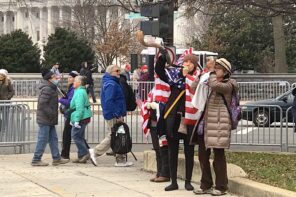Syria has been the bloodiest chapter of the Arab Spring. It’s estimated that in November alone, 3,400 Syrians were killed, with the total being estimated at between 30,000 to 50,000.
That it involves alliances and disputes betweens Arabs and Kurds, Sunni and Alawi Muslims, Salafis and secularists, peaceful protesters and armed fighters, only makes it a more complicated and fraught scenario.
I sat down with Adnan Zulfiqar, Fellow at the Truman National Security Project and a doctoral candidate in Near Eastern Studies at the University of Pennsylvania, to hear his take on the conflict. Zulfiqar recently traveled to Turkey, meeting with Syrian opposition figures, religious scholars, rebel fighters, Turkish officials and Turkish think tanks, in an effort to get a handle on what’s happening in the Syrian civil war as it approaches the two-year mark.
What did this trip tell you about the role of religion in the Syrian opposition?
Simply put, Syria is a religious country—something even atheist defectors recognize. Practically speaking, religion’s had a number of roles.
First, it’s the most potent rallying cry. Nationalism doesn’t have the same appeal as other parts of the Arab world, because nationalist slogans are a mainstay of the ruling Baath party, and religious rhetoric also gives the revolution a higher purpose. Likewise, secularism is associated with the Assad regime, and is thus tainted by the regime’s authoritarianism.
Second, Friday congregational prayers were the only place Syrians could gather en masse at the revolution’s start. The regime vigorously restricted citizens’ activities to suppress dissent, but stopping people from going to the mosque on Fridays was impossible. Hence, Friday prayers became a challenge to the regime’s absolute control.
Third, videos of regime-backed forces demanding their captives chant “there is no deity but Bashar” (a distortion of the Muslim testament of faith: “There is no deity but God”) have gone viral, awakening passionate sentiments even among the least religious. They’ve also furthered the narrative that this is a revolution against God’s “opponents.”
How did Salafis come to take such a dominant role?
Salafi “dominance” is primarily on the battlefield, but numerically they are a very small part of the revolution. Salafism has had prominent voices in Syria, but never gained a significant following, partly due to the [Syrian president Bashar al-] Assad regime’s crackdown on Salafi ideology, but also because Syrian society seemed to reject it. There was consensus, though, that a prolonged conflict meant greater Salafi influence.
The battlefield dominance requires a longer exposition than possible here, but we should bear in mind that Salafis have organized in opposition to the regime for years while Bashar built ties with other Sunni groups that took longer to break from the regime. The expertise of foreign Salafis in unconventional warfare contributed to their early success, which brought in more recruits, while Salafi discipline and leadership generated a reputation for law and order when they entered towns.
Ultimately, this all feeds into the romantic ideal of a medieval Islamic warrior: devout, fearless, and honorable. Stories of Salafi fighters, unlike their “secular” counterparts, never entering homes without permission or charging to the frontlines contributes to the mystique. Whether or not their ideology would restrict personal freedoms [should they play a role in governing Syria] is irrelevant for people when they’re being bombed.
So, does the Syrian opposition in general want a more democratic Syria?
Most of the opposition recognizes the need for democratic governance after the revolution. When asked how theocratic Syria’s future would be, most people, including conservative religious clerics, spoke frankly about the need for a pluralistic Syrian society.
The Salafi fighters are more mixed regarding democracy. Most want an Islamic state, but are divided on how to bring it about. Those influenced by al-Qaeda see force as the only option. Others, arguably the majority of the Salafis, believe an Islamic state must come from the people’s will. The question of course is how this “will” is determined.
How do people in Turkey feel about the role of political Islam in Syria?
Currently, political Islam, of the Salafi or Muslim Brotherhood (MB) variety, has no real constituency in Syria, so most opposition and Turkish officials are dismissive about its longterm viability. They don’t see the electorate being receptive to Salafism even if the revolution is.
But let me add a few points with respect to political Islam. First, the Muslim Brotherhood is not all the same. Syrian Brothers have a progressive streak, publicly signing accords committing to a pluralistic society where other MB branches, in other countries, have not. And the relationship of political Islam to fighters on the ground isn’t an easy one.
For example, “secular” fighters are a small component of the rebel force. The Free Syrian Army (FSA) is an easy reference [for media], but it doesn’t represent most rebel fighters on the ground right now. Third, while some al-Qaeda fighters are present, no group, not even Jabhat al-Nusra, considers themselves an al-Qaeda affiliate.
With the rebel push for Damascus, is Syria about to fall?
It’s difficult to predict how close Syria is to falling; most previous predictions about the trajectory of this revolution have fallen short. From most Syrian activists I spoke to, including those fighting, Damascus will be the regime’s last stand and so will not fall easily. Everyone is bracing for a prolonged fight. But Assad cannot hold power without Sunni support, so a seemingly intractable situation could change if the Sunnis of Damascus begin to openly abandon him.
If Assad doesn’t surrender, what happens next? Does the war end? Do the rebels inherit the state?
Assad’s death does not automatically signal an end to the regime; his top military brass is [from the small Shi’a sect] Alawi like him and they’re fairly powerful. They, along with shabiha militias, would likely keep resisting until a political accord was reached or they were overwhelmed. Some fear that if the regime falls, there will be a repeat of Afghanistan, with competing militias and warlords.
I think these are uninformed predictions. The beginnings of a new state might be messy, even violent, but most political transitions are. Even most Salafi fighters recognize the role of popular will alongside their desire for an Islamic state. Some may violently oppose popular rejection of their objectives, but most will likely reintegrate with their families and neighbors. A lot of these fighters are everyday Syrians, after all.
Of course, the leverage they have all depends on how quickly the conflict is resolved and who else contributes to the fight.
If things get bad for the regime, do you think they’ll use chemical weapons?
No one knows if Assad will use them, of course, but with 40,000 already dead, it’s sad that Syria has received renewed attention only because we now fear Assad may kill his own people with chemicals instead of with bullets.
Is this now a sectarian war? If so, will it draw in the rest of the Middle East?
Though it’s a popular suggestion, the demographics make sectarian “war” in Syria a challenge. This isn’t Iraq or Lebanon where you have fairly sizable populations of different groups. Syria is overwhelmingly Sunni (roughly 75%) and Assad needs them in order to hold power. No Sunnis, no Assad regime.
That said, the longer the revolution goes on, the more sectarian “conflict” will increase as people align with their ethnic or religious kin. There’s no doubt that anti-Shi’a sentiments are quite high among certain opposition factions as they blame Assad for initiating sectarian fears to suppress the rebellion and then unleashing the shabiha.
The regional split, with Iran and Sunni nations on opposing sides, only exacerbates the situation. But Syrians loathe foreign meddling and thus far the conflict has largely involved only Syrians. I don’t see this changing.
How does the Syrian opposition see the Arab Spring?
The Syrian opposition mostly considers itself an extension of the Arab Spring. Most agree that the Arab Spring created an environment that allowed the immediate causes of this conflict to turn it into a revolution. They consider their revolution far more brutal than any other, but unlike in Libya, which also involved an all-out war, there’s a deep sense of being abandoned by the world.
You were in Turkey during Israel’s war with Hamas. How did Turks and Syrians respond to this war? Was Iran’s support for Hamas a complicating factor for Syrians?
As expected, there was strong support for Palestinians and simultaneous condemnation of Israeli actions. Many Syrians saw Israeli actions through the prism of their own conflict. It facilitated several conspiracy theories including one suggesting that since an attack on Gaza which distracts from Syria benefits Assad only, it must have been jointly planned with Netanyahu.
I also sensed resentment from Syrians about the coverage and sympathies Gaza was receiving while their conflict hardly receives any. Hence, despite their support for the Palestinians, the latest Israeli operation only confirmed for many Syrians that they have been abandoned.
Iran’s support for Hamas didn’t really complicate things. Assad was Hamas’ main patron until recently and despite their dislike of him, many Syrians still supported Gaza and Hamas.
What do you want Americans to know about Turkey, Syria, and the Middle East?
The Middle East isn’t as black and white as often portrayed. Virtually every news story on the region dabbles in the sensational and indulges generalizations.
When speaking of Islamists, for example, the first question should be “which ones?” There’s a fair amount of diversity among Islamists despite some ideological similarities. Similarly, we have to make distinctions between people who are religiously conservative and those who are politically religious. Sometimes these categories overlap, but not always.
The “politically religious” set their political agenda with deference to religion; this could mean anything from an all-out Islamic state to using religious political slogans. “Religiously conservative” is simply a description of personal piety and practice; they don’t necessarily see a role for religion in politics and some even believe politics taints religion.
Across the Middle East, people strongly identify with Islam and in many countries this identification has been suppressed in one way or another by authoritarian regimes. Having secured their freedom, it shouldn’t be surprising that the people, in places like Egypt and Tunisia, are strongly asserting their religious identity.




